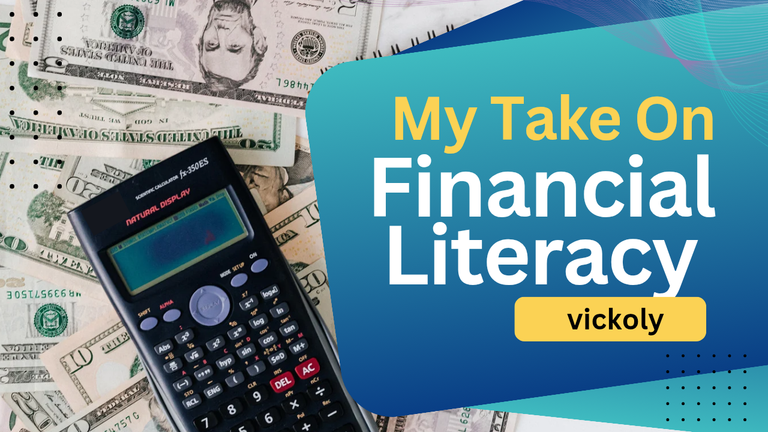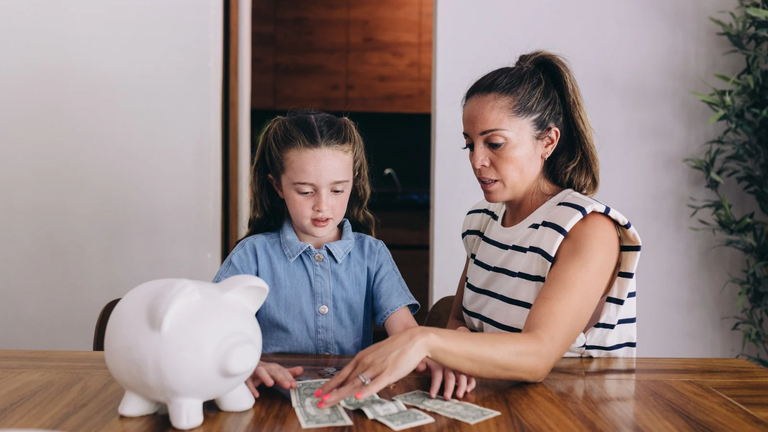The Earlier, The Better: My Take on Financial Literacy
To be honest, for most of us, especially here in Nigeria, we didn't grow up hearing phrases such as invest, compound interest, or budget, and that's probably because financial literacy wasn't something that was taught in school, and only a few parents think it wise to do that for their kids at home, leading to us seeing money as just something we either have or don't have or something we spend whenever it comes, and by the time it finishes, we wait for when it'll come next, but should that be the case when it comes to handling money? Also, when is the right time to acquire financial literacy knowledge? Those and several questions are what I'll be delving into below.

Most parents and guardians were responsible for most of our lack of financial intelligence, because personally I can remember vividly several occasions during my childhood when I wanted to save towards buying one thing or another and trusted my guardian or parents to help me save up so I could gather the money on my own to do something meaningful. At the end of the day, when you ask for such money, you'll end up hearing stories with nothing to show for all your sacrifices. Some parents will even remind you of how you've been eating freely for years as though it's not their responsibility to do that. I believe all of those acts of spending money we kept with them are a moral killer that tends to crumble our desires to save or invest, instead encouraging impulse spending.
The truth is that not until I became an adult with responsibility pecking down on my neck did I realize how important it is to understand how money works, and the awakening I had came at a point in time when I had to make a decision around saving, borrowing, and spending. Then it hit me hard that I don't have a solid grasp of personal finance or what it takes to handle money productively. It's not like I don't know how to make money, because in that aspect I'm a chronic hustler; what I didn't know was how to make the money I make via my hustle work for me.

Growing up and after coming through realization, it took a lot of time, mistakes, and tons of life experiences before I started to grasp the concept of financial literacy. To put it into perspective, I literally learned it the hard way, which is through trial and error, because I didn't have the luxury of time to take a course on it, and neither was there artificial intelligence to help out like we have now. Meaning those trials and errors include taking unnecessary loans, falling victim to impulse spending, saving without foresight or a plan, and sometimes not saving at all.
However, gradually and with time, I started reading books like that of Robert Kiyosaki, watching videos on YouTube, asking questions and listening to financially disciplined people, and that's how things began to click for me gradually, because I began to learn about budgeting, the importance of emergency funds, investing, and delayed gratification, though they were just little by little, but they're making a difference.

With what I suffered, looking back I've come to believe that financial literacy should begin as early as possible. Ideally, it should start at the primary school level; that's catching them young. Imagine if we were taught how to manage money from the same age we started learning LCM and HCF or writing essays? I'm certain that by now many of us won't have made half of the mistakes we made in our twenties, if not going into our thirties for some.
The early teen years are the perfect time to start, in my opinion, just like one of my favorite biblical phrases says: "Train up a child in the way he should go, and when he grows he'll not depart from it." Why I chose that stage is because it's the period when children start forming habits, developing identity, and thinking about the future, so teaching kids and teenagers how to save, budget, understand the difference between needs vs. wants, and invest at that stage will have a really profound and lasting effect on them, because I believe it'll set the tone for how they'll go on to relate with money throughout their lives.

Today's world is digital, and financial scams are everywhere, so it's not just all about knowing how to save; presently, it's about knowing how to avoid traps, use money wisely, and prepare for the unknown. To me, financial literacy is a survival tool and not just a skill that must be acquired.
Overall, once again I'm saying yes, I understand that financial literacy came to me late. What matters is that I've now embraced it, and I'm glad I did, and it has helped me understand that the earlier you understand money, the better your chances are at building a stable and fulfilling life, so let's turn the tides around for the coming generation by teaching them financial literacy at an early age.

All photos are taken and edited on canva.
Posted Using INLEO
I think quite the opposite, people do not need financial literacy, they need self control lol
Well everyone has an opinion and if it works for you, then that's fine.
But then, I don't think self control will teach any individual on how to invest right or known the principle of making money work for you.
All self control will do is help you manage your finances to avoid impulse spending and the likes, I might be wrong, but that's my opinion.
well everyone has their own opinions, and knowing others should enrich our perspective
!BBH !PIZZA !LOLZ
lolztoken.com
Not on my watch!
Credit: reddit
@vickoly, I sent you an $LOLZ on behalf of dewabrata
(2/8)
Delegate Hive Tokens to Farm $LOLZ and earn 110% Rewards. Learn more.
That is very true.
$PIZZA slices delivered:
@dewabrata(1/5) tipped @vickoly
Come get MOONed!
Sometimes it’s best to make mistakes and learn from them then not making them at all and staying ignorant.
Today, you’re doing much better with your finances because you gave yourself the opportunity to learn and grow .